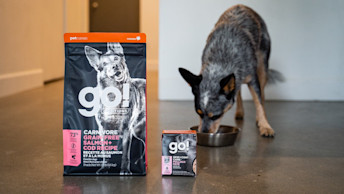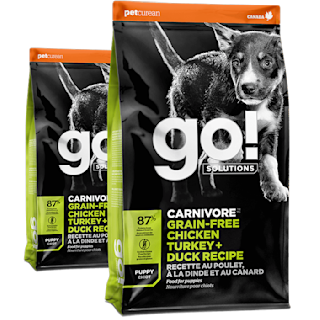February 2, 2021
How to Choose the Best Dog Food

Feeding your dog a premium quality diet is one of the best things you can do as a dog owner. Feeding the right diet for your pet can help keep them healthy and happy for many years to come. Proper diet can help keep your dog's energy up, as well as their coat looking shiny and sleek. Whether you own a puppy, an adult, or a senior dog, the right diet makes a world of difference!
The question is, how do you know which one is the best fit for your dog? With plenty of options to choose from, ranging from different textures, flavors, nutrient levels, and so much more, it can be confusing. Ultimately, you want to select the best diet that will suit all your dog's needs. Here, we breakdown the top things to look for when selecting the perfect dog food.
Invest in a Good Quality Dog Food
When it comes to your dog's health and wellness, it's important to remember that diet has a huge part to play. Investing in a good quality dog food that is complete and balanced from the start can help you be sure that your pet is getting all the nutrients they need.
What Is Your Dog's Activity Level?
A dog who goes on daily runs will have different nutritional needs than one who goes on the occasional walk. Depending on your dog's activity level, they may have unique dietary requirements and needs. If you own an energetic puppy, something like a puppy that offers various nutrients for healthy growth and development would be ideal.

Recommended Solution
A Protein Rich Recipe for Growing Dogs
Our Carnivore Chicken, Turkey + Duck Recipe is perfect for puppies that need all the minerals and protein to grow big and strong.
View product details
Likewise, if your furry friend is in the later stages of life, food that provides ingredients rich in omega-3 and omega-6 fatty acids and dietary fiber to support healthy digestion are great options to consider.
Allergies and Sensitivities
It's important always to be aware of your dog's health status. Does your dog have any signs of stiffness, sensitivities or allergies? Symptoms such as a dull coat, frequent upset tummy, joint discomfort, ear infections or persistent scratching are things to look out for. If any of these are a concern, then it may be time to consider switching foods.
Check the Quality of the Dog Food
The quality and safety of the food you select are of utmost importance. Select a brand that sets exceptionally high quality and safety standards for their food and all of their partners. A manufacturing facility that undergoes inspection by government officials and third-party auditors means that it meets very high sanitation standards, cleanliness and good manufacturing practices. To ensure you're buying dog food that meets their nutritional requirements, look for a diet that is “complete and balanced”, which lets you know that it contains all the nutrients your pet needs.
Wet Food or Dry Food?
Both wet food and dry food have their advantages. Some dogs will take to dry food right away, while others will prefer wet food. It all depends on your dog, their health and nutritional requirements.
Some of the benefits of wet food include:
Easier to digest (especially for senior dogs)
Great flavor
High moisture content than kibble
Flavor and texture variety
Some of the benefits of dry food include:
The convenience of storage and feeding
Easy to measure for diet proportions
Usually more cost-efficient
Flavor and kibble size variety
Since both wet dog food and dry dog food have their benefits, some dog owners find that mixing both provides the perfect recipe for one happy puppy. Additionally, mixed feeding is ideal for those picky eaters as it can provide more variety.
Pay Attention to the Ingredients
When it comes to ingredients, select foods that have their ingredients sourced from trusted partners. Whole food ingredients are great to provide essential nutrients to support your puppy's health. It's also important to select a food that has detailed nutrient information readily available.
Some good ingredients include:
- Fresh fish and meats
- Antioxidants
- Omega 3 & 6 fatty acids
- Fruits and vegetables
- Minerals (such as zinc and iron)
- Vitamins (such as vitamin D, A, and E)
It's important to continue to watch your dog's activity level and overall health as you transition their food and continue to feed them. Your dog's nutritional requirements will change over time as they begin to age. It all comes down to trial and error. If you’re still unsure about what food is the right choice, contact your veterinarian or a trusted pet-nutrition expert to help you make the best decision possible.


